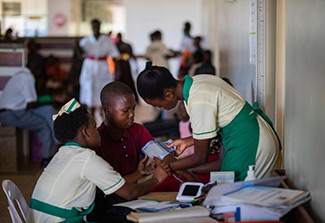Chronic, noncommunicable diseases (NCDs) news, resources and funding for global health researchers
Chronic, noncommunicable diseases (NCDs) are steadily increasing around the world, and developing countries are bearing much of the cost with 80 percent of deaths occurring there. NCDs such as cardiovascular disease,
cancer,
diabetes and lung disorders are expected to cause three-quarters of the disease burden in low- and middle-income countries by 2030.
NCDs cause untold pain, suffering, disability and hardship for millions of people. In addition, the economic costs are staggering, both in terms of lost productivity and rising health care expenses. Unless action is taken to reduce the toll of NCDs, a World Bank study estimates NCDs will cost the global economy about $35 trillion from 2005 to 2030. A number of NIH research and research training programs are working to address these health issues.
Related research topics:
Recent News
- Getting to the ‘heart’ of mentorship and global cardiovascular health
Global Health Matters, March/April 2025
-
Could a task-sharing tool for hypertension control in Guatemala benefit the US?
Global Health Matters, March/April 2025 -
NIH study finds infection-related hospitalizations linked to increased risk of heart failure
NHLBI News, February 11, 2025 -
Slaying Sickle Cell
NIH Catalyst, January/February 2025 -
Genetic carriers for sickle cell disease have higher risks of blood clots across diverse ancestries
NIH/NHGRI news, September 12, 2024 -
Is a Low-Dose Triple-Drug Combination Pill Protocol the Answer for Hypertension Control in Sub-Saharan Africa? by George A. Mensah
JAMA, August 31, 2024 -
‘Low-intensity’ blood stem cell transplants for sickle cell appear safe for lung health
NIH/NHLBI news, August 27, 2024 -
Better heart health through education: Q&A with Gene F. Kwan, MD, MPH
Global Health Matters, May/June 2024 -
PAHO releases toolkit to enhance management of cardiovascular risk and hypertension in the Americas
PAHO news, January 31, 2024
Focus: Sickle Cell Research in Africa

NIH News and Resources
Other US Government Resources
Other Online Resources
Updated August 15, 2025